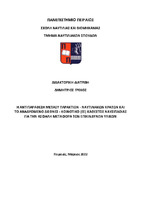Η αντιπαράθεση μεταξύ παρακτίων - ναυτιλιακών κρατών και το αναδυόμενο διεθνές - κοινοτικό (ΕΕ) καθεστώς ναυσιπλοΐας για την ασφαλή μεταφορά των επικινδύνων υλικών

Προβολή/
Λέξεις κλειδιά
Θαλάσσια μεταφορά ; Επικίνδυνα υλικά ; Αντιπαράθεση των κρατών ; Ελευθερία της ναυσιπλοΐας ; Διεθνές δίκαιο θαλάσσηςΠερίληψη
Παρότι υφίσταται διεθνές και ενωσιακό (EE) θεσμικό πλαίσιο, κατά τη δια θαλάσσης μεταφορά των επικινδύνων υλικών εξακολουθεί να παρατηρείται το φαινόμενο της αντιπαράθεσης μεταξύ των παρακτίων και ναυτιλιακών Κρατών. Η μελέτη εξετάζει τις διατάξεις του διεθνούς και ενωσιακού (ΕΕ) δικαίου οι οποίες άγουν στην αντιπαράθεση υπό την οπτική των αποδεκτών των ρυθμίσεων τους. Σημαντικό θεωρείται ότι οι αποδέκτες των συγκεκριμένων ρυθμίσεων, ήτοι τα Κράτη, είναι και οι δυνητικοί νομοθέτες. Συναφώς, αναλύονται οι αντικειμενικές των τάσεων της αντιπαράθεσης, αναγνωρίζονται οι δυνάμεις που οδηγούν σε αυτή, αξιολογείται η πολιτική, το θεσμικό πλαίσιο και ερευνάται η πρακτική των Κρατών. Η συνεχιζόμενη αντιπαράθεση μεταξύ των παρακτίων και ναυτιλιακών Κρατών συνδέεται με αλληλεξαρτώμενους παράγοντες όπως το φαινόμενο της παγκοσμιοποίησης και η αναβάθμιση του επιπέδου ζωής των ανθρώπων, η πλήρης απελευθέρωση των αγορών από την κρατική παρέμβαση, η αύξηση ζήτησης ενέργειας και μεταφορών, η άνοδος του παγκοσμίου στόλου και η εμφάνιση του φαινομένου του γιγαντισμού των πλοίων, η διεύρυνση του αριθμού των χημικών και επικίνδυνων υλικών, τα ατυχήματα πλοίων μεταφοράς επικινδύνων υλικών εντός των θαλασσίων ζωνών με αποτέλεσμα την δραματική επιδείνωση της ρύπανσης του θαλασσίου περιβάλλοντος και τη συμβολή της ναυτιλίας στην έξαρση της κλιματικής αλλαγής. Σήμερα, εντονότερα, τα πλοία μεταφοράς επικινδύνων υλικών διατρέχουν τον κίνδυνο τρομοκρατικών επιθέσεων, πειρατείας και κυβερνοπειρατείας ενώ η τάση προς την κατασκευή αυτόνομων πλοίων τέτοιου είδους συνάδει στην αντιπαράθεση. Οι εν λόγω παράγοντες συμβάλουν, σύμφωνα με τις ατυχηματικές περιπτώσεις πλοίων μεταφοράς επικινδύνων υλικών, στη ρύπανση της θάλασσας με ανυπολόγιστες κοινωνικοοικονομικές και περιβαλλοντικές συνέπειες.
Οι παράγοντες αυτοί τονίζουν την σπουδαιότητα συζήτησης και υιοθέτησης ενός νέου και αποτελεσματικότερου πλαισίου. Από τη μελέτη προέκυψε ότι το θεσμικό πλαίσιο για τη δια θαλάσσης μεταφορά επικινδύνων υλικών δεν έχει, ποτέ, μέχρι σήμερα κωδικοποιηθεί. Σχετικές προσπάθειες κωδικοποίησης φάνηκε να γίνονται, για τις, τότε, μεταφορές επικινδύνων υλικών, στην Σύμβαση της Γενεύης του 1958 για την Αιγιαλίτιδα και τη Συνορεύουσα Ζώνη αλλά και την Ανοικτή Θάλασσα χωρίς γόνιμα αποτελέσματα. Ορόσημο για την έναρξη ουσιαστικής διευθέτησης του ζητήματος αποτελεί η UNCLOS, 1982, όπου τα Κράτη-Μέρη της Σύμβασης συμφώνησαν επί της οριοθέτησης των θαλασσίων ζωνών. Παράλληλα, με την εν λόγω Σύμβαση εξετάζεται το δικαίωμα της ελευθερίας στην ναυσιπλοΐα σε σχέση με την προστασία του θαλασσίου περιβάλλοντος. Η παρούσα μελέτη επιλαμβάνεται των ανωτέρω αναφερομένων ζητημάτων και νομικοτεχνικά αναλύει (de lega lata) και ερμηνεύει (de lega ferenda) με σκοπό την εναρμόνιση του θεσμικού πλαισίου της δια θαλάσσης μεταφοράς των επικινδύνων υλικών. Με τη μέθοδο αυτή εξηγείται, μέσω του σύγχρονου δικαίου, η εξισορρόπηση της οικονομικής ανάπτυξης και της προστασίας του θαλασσίου περιβάλλοντος με την επιμελή χρήση των πλοίων μεταφοράς επικινδύνων υλικών. Εν κατακλείδι παρατηρείται ότι η ανάλυση του θεσμικού πλαισίου της δια θαλάσσης μεταφοράς των επικινδύνων υλικών επιβαρύνεται μακράν λόγω του ελλείμματος άμεσης επιβολής της διεθνούς - ενωσιακής νομοθεσίας. Στη βάση αυτή δικαιολογείται η συγκεκριμένη έρευνα, η οποία αναδεικνύει την αξία της δογματικής των περιφερειακών ή διμερών συμφωνιών ως σύγχρονων μεθοδολογικών εργαλείων για την ενδυνάμωση της ασφάλειας των δια θαλάσσης μεταφορών επικινδύνων υλικών ώστε να επιλυθεί το ζήτημα της αντιπαράθεσης μεταξύ των παρακτίων και ναυτιλιακών Κρατών.


